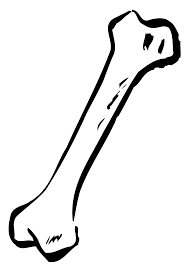bone
英 [bəʊn]
美 [boʊn]
- n. 骨;骨骼
- vt. 剔去...的骨;施骨肥于
- vi. 苦学;专心致志
- n. (Bone)人名;(英)博恩;(法、西、罗、塞)博内;(老)奔
使用频率:

记忆方法
将“bone”与“b”形象地联系起来,想象一块骨头上面有一个“b”形状的凸起,就像骨头的一个突起。这样,每次看到“b”形状的突起时,就会自然联想到“bone”,即骨头。
以上内容由AI生成, 仅供参考和借鉴
中文词源
bone 骨头
词源不详。
英语词源
- bone
-
bone: [OE] Somewhat unusually for a basic body-part term, bone is a strictly Germanic word: it has no relatives in other Indo-European languages. It comes from a presumed Germanic *bainam, which also produced for example German bein and Swedish ben. These both mean ‘leg’ as well as ‘bone’, suggesting that the original connotation of *bainam may have been ‘long bone’.
- bone (n.)
- Old English ban "bone, tusk," from Proto-Germanic *bainam (cognates: Old Frisian ben, Old Norse bein, Danish ben, German Bein). No cognates outside Germanic (the common PIE root is *os-; see osseous); the Norse, Dutch, and German cognates also mean "shank of the leg," and this is the main meaning in Modern German, but English never seems to have had this sense.
- bone (v.)
- especially in bone up "study," 1880s student slang, probably from "Bohn's Classical Library," a popular series in higher education published by German-born English publisher Henry George Bohn (1796-1884) as part of a broad series of "libraries" he issued from 1846, totaling 766 volumes, continued after 1864 by G. Bell & Sons.
权威例句
- 1. A vicious price war between manufacturers has cut margins to the bone.
- 制造商之间的恶性价格战已将利润削减到了最低。
- 2. Our bone marrow contains fat in the form of small globules.
- 我们的骨髓中含有小球状的脂肪。
- 3. The bullet lodged in the sergeant's leg, shattering his thigh bone.
- 子弹嵌进了中士的腿里,使其股骨碎裂。
- 4. The body is made up primarily of bone, muscle, and fat.
- 人体主要是由骨骼、肌肉和脂肪构成。
- 5. A child was wrongly diagnosed as having a bone tumour.
- 一个孩子被误诊为患了骨瘤.
